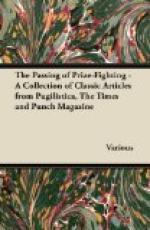V.
J. We missed you badly at
our board last night.
K. The loss was mine.
I could not get a cab.
Whistling, as
you’re aware, is banned by law,
And when I went
in person on the quest
The streets were
void of taxis.
J.
And to what
Do you attribute
this unusual dearth?
K. The general rush to Halls
of Mirth and Song,
Never so popular.
The War goes well,
And London’s
millions needs must find a way
To vent their
exaltation—else they burst.
J. But could you not have
travelled by the Tube?
K. I did essay the Tube, but
found it stuffed.
The atmosphere
was solid as a cheese,
And I was loath
to penetrate the crowd
Lest it should
shove me from behind upon
The electric rail.
J. Can you
account for that?
K. I should ascribe it to
the harvest moon,
That wakes romance
in Metropolitan breasts,
Drawing our young
war-workers out of town
To seek the glamour
of the country lanes
Under the silvery
beams to lovers dear. O.S.
* * * * *
FORCE OF HABIT.
The fact that George had been eighteen months in Gallipoli, Egypt and France, without leave home till now, should have warned me. As it was I merely found myself gasping “Shell-shock!”
We were walking in a crowded thoroughfare, and George was giving all the officers he met the cheeriest of “Good mornings.” It took people in two ways. Those on leave, blushing to think they had so far forgotten their B.E.F. habits as to pass a brother-officer without some recognition, replied hastily by murmuring the conventional “How are you?” into some innocent civilian’s face some yards behind us. Mere stay-at-homes, on the other hand, surprised into believing that they ought to know him, stopped and became quite effusive. As far as I can remember George accepted three invitations to dinner from total strangers rather than explain, and I was included in one of them.
We were for the play that night and I foresaw difficulties at the public telephone, and George’s first remark of “Hullo, hullo, is that Signals? Put me through to His Majesty’s,” confirmed my apprehensions.
Half-an-hour of this kind of thing produced in me a strong desire for peace and seclusion. A taxi would have solved my difficulty (had I been able to solve the taxi difficulty first), but George himself anticipated me by suddenly holding up a private car and asking for a lift. I could have smiled at this further lapse had not the owner, a detestable club acquaintance whom I had been trying to keep at a distance for years, been the driver. He was delighted, and I was borne away conscious of twenty years’ work undone by a single stroke.




